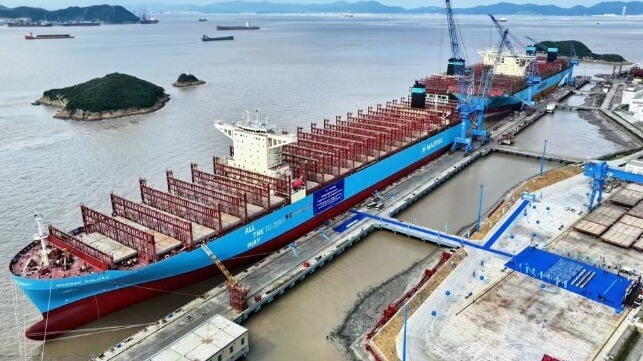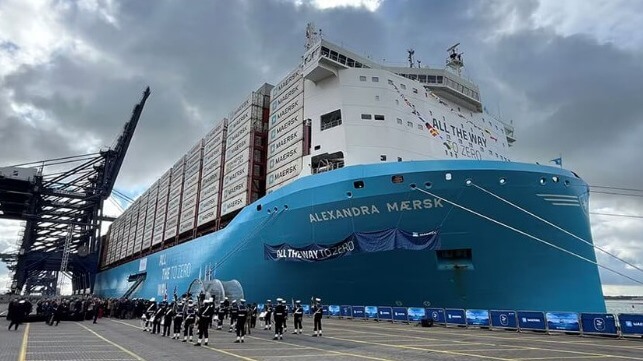First Large Containership Methanol Conversion Completed for Maersk Halifax

Ceremonies were conducted in China on October 29 marking the completion of the conversion of the Maersk Halifax into a dual-fuel methanol vessel. It is being hailed as a landmark in the effort toward green shipping as it becomes the first large, in-service vessel converted for methanol operations.
The work was completed at the Zhoushan Yatai Ship Engineering and Repair Co. where the vessel arrived in July, although work had begun with steel cutting in March 2024 after the 2023 contract signing. The shipyard prefabricated sections to speed the conversion time which is reported as lasting 236 days.
The modification project is reported to have involved the modification of the main engine, the installation of methanol tanks, and the lengthening of the overall lengthening of the ship. Built in 2017 in South Korea as the Maersk Honam, the vessel was a casualty in 2018 but rebuilt and returned to service renamed Maersk Halifax. Prior to the methanol conversion, the vessel was listed as 1,158 feet (352 meters) in length with a capacity of 15,226 TEU. The Chinese reports are saying the vessel is now 1,204 feet (367 meters) and Maersk lists the vessel with a nominal TEU capacity of 15,262.
“Retrofitting a MAN B&W engine to dual-fuel running is straightforward as our standard, electronically-controlled ME-C diesel engines are constructed as ‘dual-fuel ready’ and therefore readily retrofittable,” commented Klaus Rasmussen, Head of Projects and PVU Sales at MAN PrimeServ, when the contract was announced in June 2023.
Maersk noted however that it faced space challenges for the project which involves adding a new fuel line for methanol alongside the traditional fuel line. Alfa Laval provided the fuel supply system. Chengxi Walxin Special Coatings Co., a division of CSSC, applied a special inorganic zinc coating for the methanol tank which it reported is 2,800 square meters.
The vessel was reportedly fueled with methanol in mid-October. The Maritime and Safety Administrated listed the vessel as undergoing sea trials between October 16 and 20. Maersk’s online systems reflect the vessel as departed Shanghai on November 5 and making stops in China and South Korea before crossing the Pacific to APM Terminals Lazaro Cardenas in Mexico.
Maersk previously said it would continue the retrofit project to other ships of the class. They are planning a conversion on a sister ship timed to a special survey due in 2027.
Other major carriers including COSCO, CMA CGM, and Seaspan working with Hapag-Lloyd have announced plans for similar methanol fuel conversions. Work began last week at Shanghai COSCO Shipping Heavy Industry for the first project on a 20,000 TEU COSCO containership. This project is being promoted as another advancement as both the MAN S90 main engine and the Wärtsilä W32 auxiliary engine are being converted to operate on methanol. Steel cutting began for the project.
Maersk Signs Long-Term Methanol Sourcing Deal in China

Maersk entered into a new long-term bio-methanol offtake agreement while highlighting that China continues to play a pioneering role in the development of alternative fuels. With this latest agreement, Maersk reports its combined methanol offtake agreements now meet more than 50 percent of the dual-fuel methanol fleet demand in 2027.
LONGi Green Energy Technology Co., a developer of photovoltaic and solar power projects and an electrolyzer manufacturer, will supply the bio-methanol produced at a facility in Xu Chang, Central China. The bio-methanol will be produced from residues of straw and fruit tree cuttings, with the first volumes expected in 2026. Full production is expected at the end of the decade.
Maersk notes that this agreement has evolved out of its growing global alternative fuels portfolio. The company which has previously said the supplies of the alternative fuel were in short supply notes that several of its other methanol projects “are currently in advanced stages of maturity,” including current efforts with several promising projects in the U.S. The company states that bio- and e-methanol continue to be the most promising alternative shipping fuels to scale up in this decade.
Developing a steady supply remains a key part of Maersk’s decarbonization strategy. The company notes that it now has seven of its dual-fuel methanol vessels, including six of the 16,000 TEU vessels in service. The company has orders for a total of 25 dual-fuel methanol vessels with the deliveries underway while it also has underway the conversion of its first in-service vessel to operate as dual-fuel methanol.
While the company continues to espouse the virtues of methanol, Maersk was seen as wavering on its strategy as part of its current fleet renewal program. In August, Maersk reported it had elected a mix of methanol and liquified gas dual-fuel propulsion systems saying in the short term, Maersk also foresees a multifuel future for the industry which includes liquified bio-methane. Once the fleet renewal is implemented, Maesk says around a quarter of its fleet will be equipped with dual-fuel engines.
“Global shipping’s main net-zero challenge is the price gap between fossil fuels and the alternatives with lower greenhouse gas emissions. We continue to strongly urge the International Maritime Organization’s member states to level the playing field by adopting a global green fuel standard and an ambitious pricing mechanism which the industry urgently needs,” the company said announcing the new offtake agreement.
Maersk says it believes that the future of global logistics will see several pathways to net-zero, with today’s agreement underscoring the continued momentum for methanol projects.
China continues to play a pioneering role, and it is encouraging to also see strong market developments in other geographies as well. One example is the US where we are engaging closely with several promising projects.
No comments:
Post a Comment